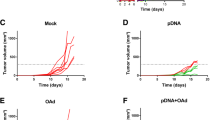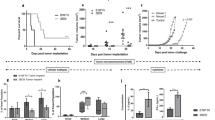Abstract
Vaccination against tumors relies on tumor-associated antigens, and has been quite successful with synthetic peptides used as immunogens. Gp100 is a human melanoma-associated antigen (hgp100) with a highly homologous mouse counterpart, pmel17/gp100 (mgp100), that is expressed in melanocytes and highly tumorigenic B16 melanoma cells. Since mgp100 is poorly immunogenic in mice, we used a xenoimmunization approach and vaccinated with the hgp100 immunogene. To that end, plasmid DNA encoding hgp100 was applied as a vaccine in combination with three synthetic peptides corresponding to putative cytotoxic T cell epitopes of hgp100. Immunization with DNA and peptide-pulsed spleen cells had a synergistic effect and provided significant protection against a challenge with poorly immunogenic B16-F0 malignant melanoma cells in the syngeneic C57BL/6 mouse model. Vaccination with either plasmid DNA or peptides alone delayed the onset of tumor formation, and reduced tumor growth 2-fold and 30-fold, respectively. However, while all animals vaccinated with DNA encoding hgp100 or with peptides eventually developed tumors, 30% of the animals treated with both vaccines remained tumor free and survived for the entire observation period of 150 days. Depletion of T cell subsets revealed that the protective effect observed after vaccination with plasmid DNA was mediated by CD4+ and CD8+ T cells, while protection following vaccination with DNA encoding hgp100 in combination with peptides appears to depend on CD4+ T cells only. Furthermore, we could also demonstrate a therapeutic effect of the combined DNA/peptide regime. A single treatment cycle consisting of injections of plasmid DNA and peptide-pulsed spleen cells led to a fourfold reduction in the growth rate of preexisting tumors. The data presented demonstrate that immunization with xenoantigens induces cross-species priming leading to an immunological response against the tumor-specific antigens.
Similar content being viewed by others
Author information
Authors and Affiliations
Additional information
Electronic Publication
Rights and permissions
About this article
Cite this article
Nawrath, M., Pavlovic, J. & Moelling, K. Synergistic effect of a combined DNA and peptide vaccine against gp100 in a malignant melanoma mouse model. J Mol Med 79, 133–142 (2001). https://doi.org/10.1007/s001090000159
Received:
Accepted:
Published:
Issue Date:
DOI: https://doi.org/10.1007/s001090000159




